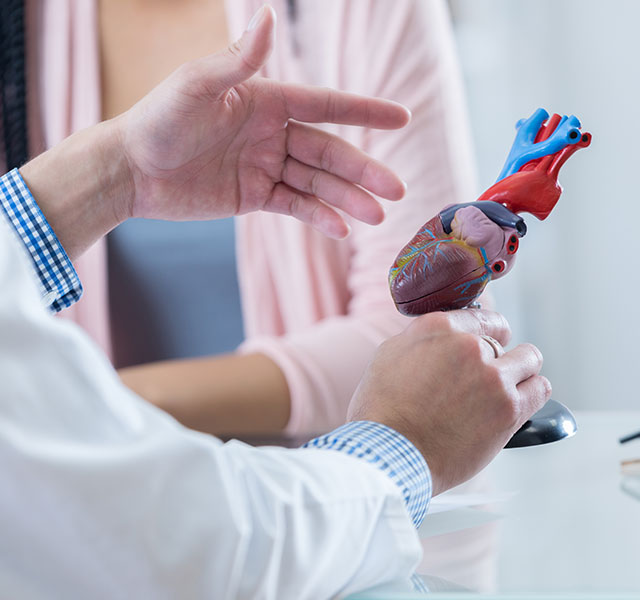Once, open-heart surgery was the only way to treat severe heart valve disease. These days, you may be able to choose a simpler option.
“Transcatheter valve replacement or repair options offer an alternative to open-heart surgery,” says Brian O’Neill, M.D., an interventional cardiologist at Henry Ford Health.
Here’s how to tell if you’re a candidate and which type of treatment may be best for you.
What Is Heart Valve Disease?
The heart has four valves that control blood flow in and out of the heart. Heart valve disease can affect each of them in two ways:
- Regurgitation: Also known as leaky valves, this occurs when the valves don’t close tightly, and blood leaks backward
- Stenosis: This condition causes valves to become stiff and narrow, preventing them from opening completely. Stenosis can restrict blood flow.
These conditions can cause symptoms such as chest pain, fatigue, shortness of breath, dizziness and even passing out. They can also damage the heart over time. Luckily, there are effective ways to treat them.
What Are Transcatheter Treatments For Heart Valve Disease?
In traditional surgery, doctors open the chest and stop the heart to replace or repair the valves. Transcatheter options are much less invasive. “We perform most of these therapies through narrow tubes (or catheters) placed into a vein or artery, usually in the leg,” Dr. O’Neill explains.
Using real-time X-rays to guide them, specialists like Dr. O’Neill thread the tube through the vein or artery to reach the heart. From there, they use narrow instruments to repair the valve or replace it with a new one. It’s all done from inside the blood vessel — no stopping the heart or opening the chest required.
And patients recover much faster. “For most of these procedures, you go home the next day and get back to living your life relatively quickly,” Dr. O’Neill adds. For some, it can take up to three months before symptoms improve. But others start feeling better right away.
5 Types Of Transcatheter Heart Valve Disease Treatments
These minimally invasive procedures are available to treat heart valve disease:
- Aortic valve: Doctors use transcatheter aortic valve replacement (TAVR) to treat aortic stenosis. Transcatheter options for leaky aortic valves aren’t yet widely available. But researchers (including those at Henry Ford Health) are testing new procedures in clinical trials.
- Mitral valve: Transcatheter mitral valve replacement (TMVR) and repair can treat mitral valves with regurgitation or stenosis. One popular option for a leaky mitral valve is the transcatheter edge-to-edge repair (MV-TEER) procedure, which uses a small clip to help the valve shut tightly.
- Pulmonary valve: Transcatheter pulmonary valve replacement (TPVR) can treat both pulmonary valve regurgitation and stenosis. TPVR is especially useful if you have a previous valve replacement that has worn out.
- Tricuspid valve: Transcatheter options for tricuspid valves are further behind. But researchers are testing new options in clinical trials, Dr. O’Neill says.
- Balloon valvuloplasty: In this transcatheter technique, a doctor inflates a balloon to widen narrowed heart valves. Valvuloplasty is an option in all four heart valves — but it’s usually a temporary treatment to help improve patients’ health so they can have a replacement procedure.
Is Transcatheter Valve Replacement Right For You?
Transcatheter treatments are great options for treating heart disease, but they aren’t for everyone. The U.S. Food and Drug Administration (FDA) has approved some transcatheter options only for people who aren’t healthy enough for open-heart surgery. But that’s likely to change, Dr. O’Neill says, as researchers test treatments in more people.
The type of replacement valve you choose also matters. All transcatheter valve replacements use valves made from human or animal tissue. But tissue valves don’t last as long as mechanical valves made of carbon and metal. “We can only put in mechanical valves during open-heart surgery,” Dr. O’Neill explains. “But some younger patients decide to go with mechanical valves, since they’ll last a lifetime.”
If you do have the option to get a transcatheter treatment, your doctor will do some tests to make sure your blood vessels can handle the procedure. That testing also helps doctors figure out the right size and type of valve for you, and what route to take through your blood vessels.
But before you commit, Dr. O’Neill recommends getting care (or a second opinion) at a large valve center that offers lots of options, including clinical trials. “There continues to be a lot of innovation in structural heart disease,” Dr. O’Neill says. And the latest transcatheter treatments can help you feel better and get back to doing the things you love.
If you or someone you love has been diagnosed with a heart valve disease, learn more about the Center for Structural Heart Disease at Henry Ford Health or request an appointment.
Dr. Brian O'Neill is an interventional cardiologist who sees patients at Henry Ford Hospital and Henry Ford Macomb Medical Pavilion.



